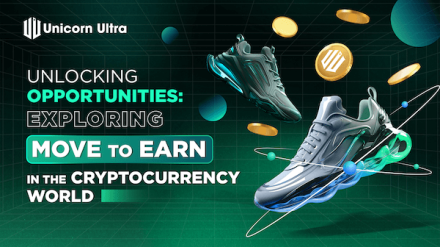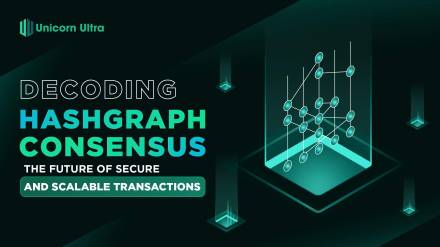Open-source characteristic is often emphasized as an aspect of the diverse and transparent identity of Blockchain, which contributes to it becoming the ideal foundation for decentralized ecosystems. This characteristic is accompanied by the presence of Software Development Kits or SDKs, forming the essential duo of every blockchain project. So, what are Software Development Kits (SDKs)?
Table of Contents
What are Software Development Kits (SDKs)?
What are Software Development Kits (SDKs)? Terminology Software Development Kits or SDKs are defined as a package of tools and data that allows developers to create or custom a specific programming language for a specific platform or application and thus get all the information behind a blockchain (or any other popular tech) application.
This definition reflects the importance of SDKs for the programming process inside the core structure of blockchain projects. For any blockchain, SDKs exist that not only allow for improving and enhancing network stability and diversifying applications in the ecosystem but also help developers create new breakthrough solutions. This industry has even witnessed many projects discovering landmark changes thanks to SKDs.
Today, most application and software developers need SDKs to add-in advanced features, display push or pop-up notifications for applications, or help display ads. Especially in the world of big data for businesses, SDKs allow developers to turn an ordinary code package into an easy method for modifying blockchains and finally monetize all the data required.
SDKs are sometimes confused with APIs (Application programming interfaces) thanks to the ability to connect and interact with different software. However, the API does not create an application from scratch but is an interface to a service, while the SDK is a set of tools, components, or codes that developers use to create an application.
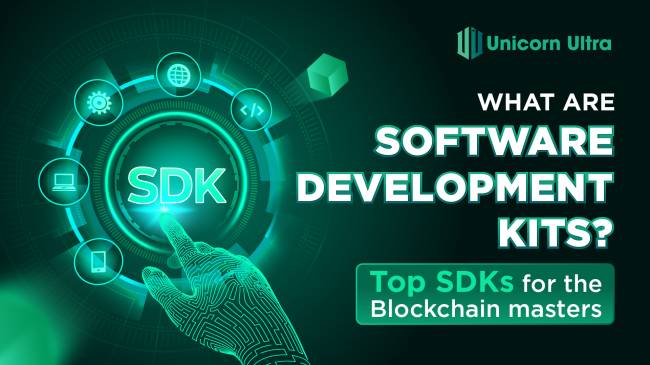
What do the Software Development Kits consist of?
SDKs are nothing more than a toolkit that includes the elements necessary for a developer to create an application in a specific environment - specifically blockchain, within the scope of this article.
The components of these development kits always depend on the vendor, but in most of the ecosystem, we can find the following:
- Libraries: Collections of predefined code snippets that enable developers to perform common programming tasks on the platform.
- Documentation: Necessary technical information related to the platform's core, providing programming knowledge, updates, etc.
- Application programming interface (API): an essential code that provides a well-defined link between two separate applications.
- Task tools: Tools that help developers perform tasks such as debugging, building, running, and testing their applications.
- Other resources help simplify the development process.
How do Software Development Kits work?
SDKs will give a tool kit of resources and helpers that are opinionated to a specific use case to create an application.
In an easy-to-understand way, SDKs are like building a bicycle - You will need a whole kit to put it together and the tools to assemble it. Moreover, to make sure you’re doing everything in order and correctly, you will use an instruction manual and the kit pieces themselves.
SDK contains different software tools opinionated to a specific use case that depends on the function or features of the application you want to build. It helps developers build everything from (almost) the beginning. The build uses SDKs that are almost always created using specific programming languages corresponding to each blockchain. For example, SDKs for Ethereum often use Solidity.
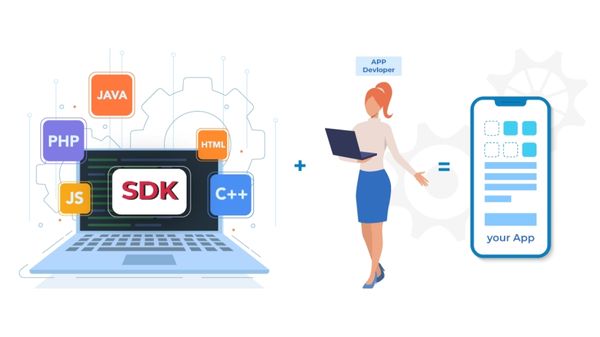
Benefits of Software Development Kits
- Comprehensive tools and resources: SDKs have all-in-one. It offers software tools, libraries, relevant documentation, code samples, processes, and/or guides that allow developers to create software applications for a specific platform more efficiently.
- Save time and money: Developers are given the tools and instructions to build what they need. They don’t need to research code, pieces, and the sequence that goes into building a certain feature.
- Simplify the process: SDKs are tailored for specific platforms or functionalities, helping streamline the development process while eliminating complexity.
- Enhance a user's journey: SDKs can provide the product with additional features that quickly enhance users' journey by including features in their app, such as pop-up/push notifications, ads, etc.
- Create an identity feature: SDKs have the ability to create unique features for a specific application in accordance with its needs and goals. In other words, SDKs help create identity for that application.
- Shorten sales cycle: Thanks to the ability to integrate with operating systems, platforms, and accompanying software quickly, SDKs can simply perform many transactions at the same time.
What challenges do Software Development Kits face?
- Limited support: SDKs are typically specific to a specific blockchain or programming language, limiting their usefulness to developers who want to build cross-chain applications.
- Dependency on updates: Developers may become passive because of this dependence. Updates to blockchains often lead to required changes in SDKs; these changes may affect the functionality of the developers aiming for their applications.
- Rigid development environment: SDKs can provide a rigid development environment, limiting the flexibility and creativity of developers in building applications.
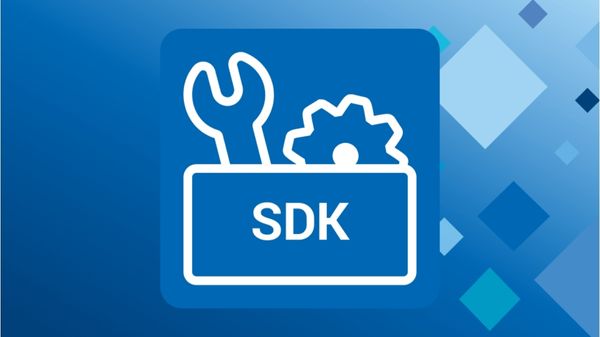
Top SDKs for blockchain developers
- Solidity: An open-source high-level object-oriented programming language popularly used for creating smart contracts and decentralized applications (dApps). It was highly inspired by Javascript, C++, and Python, making it easy and relatable for developers to understand. Especially, Solidity can be used as the programming language for the Ethereum Virtual Machine (EVM).
- Hyperledger Fabric: An open-source blockchain platform that is maintained by the Linux Foundation. It is designed for enterprise use cases and is intended to be a foundation for building blockchain applications and networks. Hyperledger Fabric has a modular architecture and supports pluggable components, which makes it easy to customize and extend. It also has a flexible consensus model that allows users to choose the consensus algorithm that best fits their needs.
- Ethereum: A well-known blockchain with its smart contract feature that uses a decentralized virtual machine, called the Ethereum Virtual Machine (EVM), to execute. The EVM is a global, open-source computing environment that is designed to be run on a decentralized network of computers. It allows developers to build and deploy decentralized applications (DApps) and write smart contracts in various programming languages.
Conclusion
Blockchain is now a popular technology globally, and like all other technology, it must continuously innovate if it does not want to become obsolete. The existence of SDKs is vital not only for Blockchain but also for other technology. But within this industry, the benefits that SDKs bring to Blockchain developers sometimes promise breakthrough potentials waiting to be discovered and can lead to a stronger global boom of Blockchain. This article has helped readers understand what are Software Development Kits. Please stay tuned to U2U for more valuable updates on blockchain technology.



